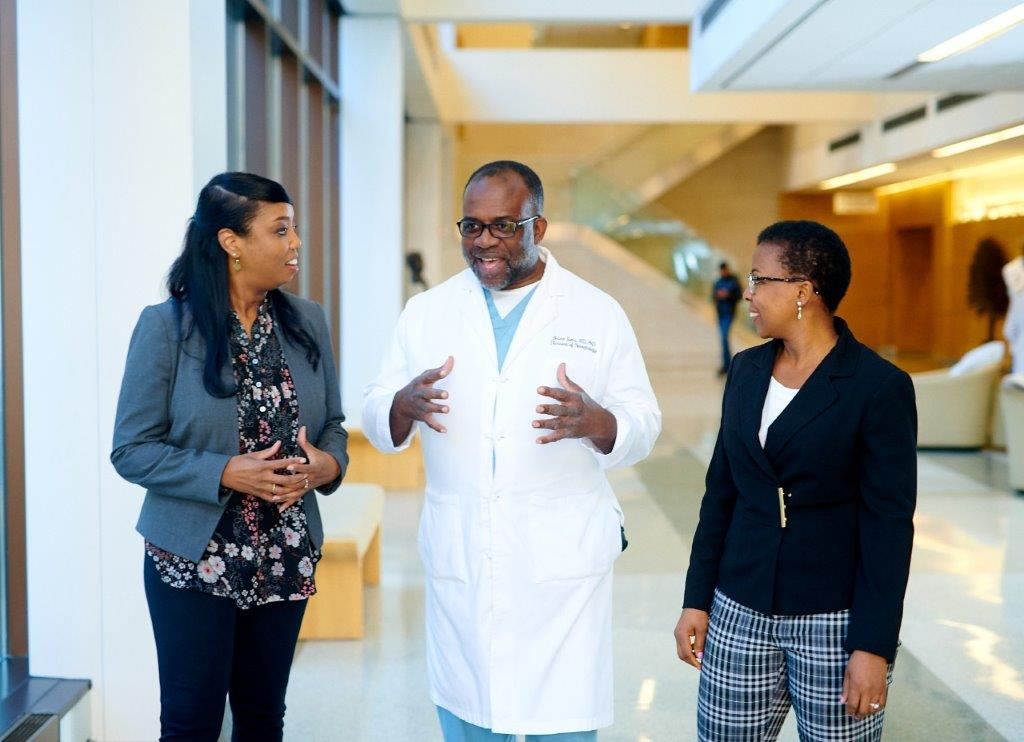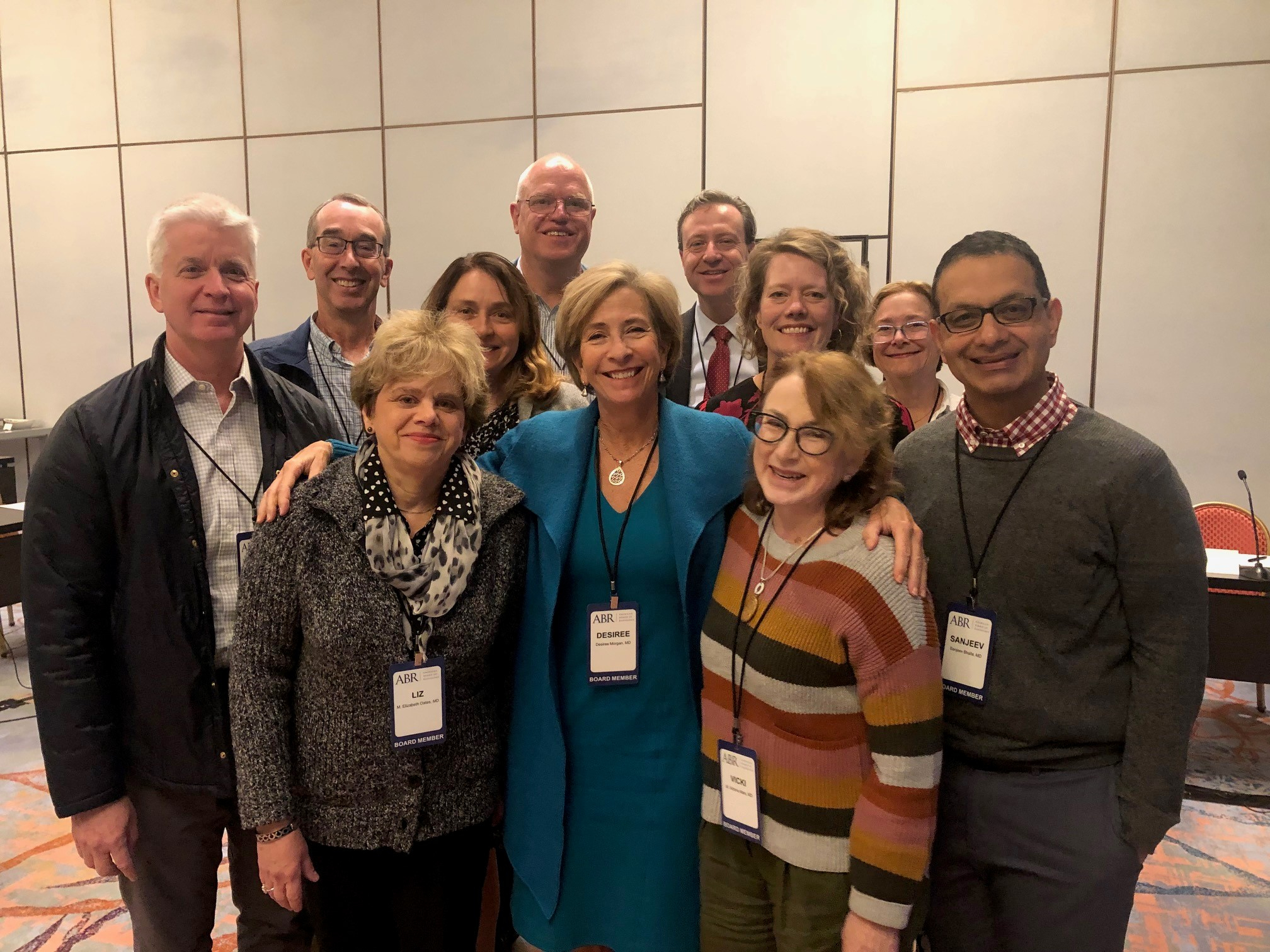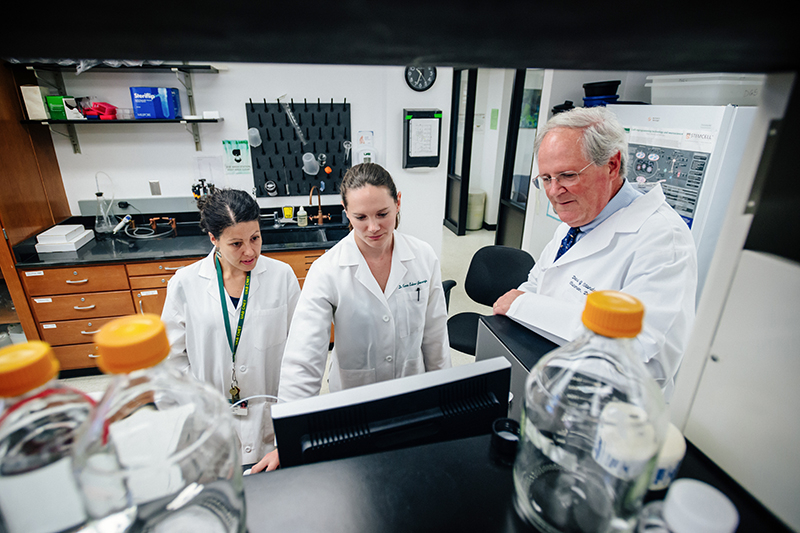Mentoring is a critical tool in faculty development and in facilitating faculty success and retention.
Under the leadership of Dr. Alecia Gross, Associate Dean of Faculty Affairs and Development, we have implemented a structured and intentional Faculty Mentoring Program which will enhance and further develop current mentoring practices within Heersink School of Medicine. Dr. Gross, a CIMER-certified mentoring facilitator, works closely with mentoring facilitators from each department/division to ensure that all Heersink School of Medicine faculty have access to quality mentoring and that mentoring is recognized across the campus as a key aspect of faculty life. A primary objective of the mentorship program is to help faculty attain promotion.
It is an expectation that all departments within the Heersink School of Medicine have a structured mentoring program. Each department has the autonomy to manage its mentoring program based on current practices, or it may adopt some of the procedures and best practices outlined here for running a successful mentoring program. For example, an Individual Development Plan may be a great resource for faculty focused on research, but it may be less beneficial for clinical faculty. A minimum expectation is for all departments to identify a mentoring facilitator(s) and to document what is being done to ensure adequate mentoring for faculty at the assistant professor level. The best way to document outcomes is to include it in both the mentor’s and mentee’s annual evaluations.
 Alecia K. Gross, PhD, FARVO
Alecia K. Gross, PhD, FARVO
Associate Dean, Faculty Affairs and Development
Heersink School of Medicine
Professor of Neurobiology
agross@uab.edu
The mentoring program that is recommended by the Heersink School of Medicine covers:
- Mentoring Facilitators’ Responsibilities
- Choosing a Mentor
- Types of Mentors
- Information for Career Mentors (including checklists)
- Information for Mentees (including checklists)
- Forms (mentoring agreements, IDP, Mentoring Committee Report, and Evaluation Forms)
- Resources
Our team in Faculty Affairs & Development is available to provide assistance and support. For more information or questions about the mentoring program, please contact Kelly Moore at kellymoore@uab.edu or (205) 996-8102.
The recommended structure and key resources of the Faculty Mentoring Program are provided in the expandable sections below. In brief:
Minimum expectation:
- Every assistant professor is mentored
- Mentee plays an active role in selecting mentors and sets up meetings
- Each meeting is documented
- Mentee/Mentors meet annually
Standard expectation:
- Use the resources we provide on this website
- Have at least two mentors for each mentee (one inside department/division, one outside)
-
Introduction
Successful faculty are essential to the University of Alabama at Birmingham’s mission to serve students, patients, the community, and the global need for discovery, knowledge dissemination, education, creativity, and the application of groundbreaking solutions. Faculty mentoring has long played a key role in faculty development throughout UAB Heersink School of Medicine. We are ranked among the top 8% of universities worldwide in the U.S. News & World Report 2022-2023 “Best Global Universities” list.
A Faculty Mentoring Survey conducted in 2022 through the Heersink School of Medicine found that faculty need set guidelines for a structured mentorship program with access to quality mentoring resources. In addition, mentoring is positively associated with many aspects of the faculty climate including overall career satisfaction, advancement, support from supervisors, and opportunity for leadership and grants. Mentoring has been shown to enhance research productivity (Bland & Schmitz, 1986; Bland et al., 2002; Byrne & Keefe, 2002), to enhance teaching effectiveness (Williams, 1991), and to increase faculty retention, recruitment, productivity, and satisfaction, as well as to decrease faculty attrition. In addition, mentoring may promote a more positive organizational climate (Corcoran & Clark, 1984; Melicher, 2000).
- Mentoring Facilitators
-
Mentoring Facilitators’ Responsibilities

- Set up mentee/mentor pairs.
- Expectation is that all assistant professors have two mentors: one internal mentor, someone inside their department/division (not direct report); one external mentor, someone outside their department/division.
- Getting started with a New Mentor Checklist
- Provide oversight for their Department’s or Division’s mentoring program
- Disseminate goals and expectations of program to faculty in respective units
- Troubleshooting mentoring-related problems that arise
- Step 1: Identify the Issue and try these common strategies
- Communication difficulties: Clarify expectations for communication, meeting frequency, and preferred methods.
- Misaligned expectations: Revisit goals and roles together; document shared expectations to ensure alignment.
- Limited progress toward goals: Break goals into smaller steps, identify barriers, and adjust plans as needed.
- Scheduling challenges: Establish a recurring meeting time and use shared calendars to maintain consistency.
- For a more detailed listing of challenges and strategies, please visit this link.
- Step 2: Meet with a Mentoring Facilitator
- If challenges continue, mentor-mentee pairs are encouraged to meet with a departmental mentoring facilitator for additional guidance.
- Step 3: If further support is needed, contact Dr. Alecia Gross for individualized assistance.
- Step 1: Identify the Issue and try these common strategies
- Provide feedback to mentors and mentees as needed
- Collect data using the Mentoring Committee Report- (e.g., are meetings taking place, what is covered in these meetings, satisfaction, etc.) to include in annual faculty reviews
- Work with the Office of Faculty Affairs to:
- Collect and analyze data from their Department/Division
- Disseminate findings and recommendations
- Attend mentoring workshop
- We suggest that the mentors and mentee commit to meeting for at least one academic year. A minimum of two meetings per year should be scheduled.
- Additional meetings can be scheduled as needed throughout the year.
It is not the facilitator’s role to be the expert on mentoring relationships
Selection Phase: Mentors
The selection phase begins by taking the time to gain clarity about your motivation to mentor as well as the strengths, goals, and areas of development of your potential mentee. The more information you can gain and share in investigatory meetings with potential mentees the better the ultimate fit will be. Review the material below to set yourself up for a successful match.
Mentor Responsibilities in the Selection phase:
- Have a clear understanding of your motivation to be a mentor
- Agree to mentor based on a realistic assessment of your skills, leadership experience and availability
- Be open to mentoring individuals from outside your discipline
- Train to be a more effective mentor
Questions to ask yourself before beginning:
What is your motivation?
Are you interested in working with junior researchers who have stimulating ideas, and who would benefit from opportunities to learn and grow with and from you? Good mentors engage with promising people with promising ideas about an area of research related to their work to deepen their translational reach and understanding. What do you need in order to bring your best self forward as a mentor? Gain insight into your decision process by writing a mentoring philosophy for your own reflection, which you can also share with potential mentees.
Do you have time to mentor?
Mentoring requires a meaningful investment of time and attention, so it’s important to reflect on whether you can commit to regular meetings, active listening, and honest, constructive feedback. Effective mentors guide career development, help colleagues navigate institutional structures, and build trusting relationships grounded in confidentiality. They adapt to each mentee’s needs, stay patient and persistent in supporting another faculty member’s growth, and connect mentees with additional resources or colleagues when their needs extend beyond their own expertise.
What are mentees looking for?
The support mentors provide are many, and you should not feel as if you need to meet each of the needs of every mentee. Instead, help potential mentees understand what it is you can provide and determine what unmet needs other mentors might provide as part of a mentor team. To help you determine the mentee’s needs and your own resources, consider common roles and expectations for mentors and mentees as a starting point.
How can you get started?
The initial conversations between you and your mentee set the tone for the relationship. The focus should be on building rapport, setting clear expectations (roles, communication, meeting logistics), and defining goals. It is often helpful to utilize icebreakers and open-ended questions about backgrounds, challenges, and aspirations to create a comfortable, productive foundation for the relationship. Remember that the development of the mentee is the key focus of the mentoring relationship. Having the mentee complete an Individual Development Plan will help the mentee articulate their desires and needs and will give you both a clear place from which to begin your conversations.
Should you consider team mentoring?
The days of a singular mentoring dyad are quickly passing. Limited time and the increasingly interdisciplinary nature of science are encouraging mentors to combine forces with colleagues to meet the diverse needs of a single mentee, allowing each mentor to leverage their strengths. Team mentoring can take many forms—for example, two co‑mentors who meet jointly with a mentee, a primary mentor supported by one or more secondary mentors who provide targeted expertise, or a small mentoring committee that meets periodically to offer coordinated guidance. We recommend at least two mentors per mentee—one from within the mentee’s department and one from outside the department or institution.
How can you become a more effective mentor?
Strong mentorship has been linked to enhanced mentee productivity, self-efficacy, career satisfaction, and is an important predictor of the academic success of scientists in training. Despite this, mentoring is typically learned by example, trial and error, and peer observation.
- Set up mentee/mentor pairs.
-
How to be a Good Mentor
UAB ODI AAPI Webinar PowerPoint presentation - How to be a Good Mentor
UAB ODI AAPI Webinar YouTube video - How to be a Good Mentor -
Choosing a Mentor
Choose a mentor who has many of the following qualities:
- Interest in developing your career
- Commitment to mentoring
- A match with your professional and personal needs
- Professional competence
- A successful track record in mentoring
- Good communication skills
- Will provide networking opportunities
- Is institutionally savvy
- Expresses interest in you as a person
- There is potential for reciprocity
- Mentoring Agreement
-
Characteristics of an Effective Mentor
Competence
- Professional knowledge and experience
- Interpersonal skills and good judgment
Confidence
- Shares network of contacts and resources
- Shares credit
Commitment
- Invests time, energy, and effort to mentoring;
- Shares personal experience
-
Types of Mentors

Career Mentors
Responsible for overall career guidance and support for their mentee. The Career Mentor is usually in the mentee's department, should not be their direct supervisor, and is assigned (or approved) by the departmental mentoring facilitator affiliated with the Faculty Mentoring Program. Scheduled meetings take place at least 2-3 times per year.
Research and Scholarly Mentors
Responsible for the overall research and/or scholarly career guidance and support for their mentee. The Research/Scholarly Mentor must have expertise in the mentee’s area of research or scholarship and often share resources with the mentee that may include databases, space, funding, and research staff that can facilitate the mentee's research. Scheduled meetings take place 1-2 times per month or as needed to achieve the mentee's research goals.
Co-Mentors
Work with the mentee and their other mentors as part of the mentoring team to provide more specialized or different content area, clinical or methodological expertise. For example, for a clinical researcher, co-mentors may include a statistician, and/or a laboratory-based scientist. Scheduled meetings occur every 1-3 months or as needed.
Advisor
have informal relationships with mentees and are less invested than mentors in the long-term career success of the mentee. Advisors may assist in such areas as developing and refining the mentee's program of research, networking, and personal-professional balance. Meetings are arranged on an as-needed basis
Advocates
Put their social capital on the line to help others.
Sponsors
Like advocates, use their influence to help advance your career.
-
Helpful Information for Career Mentors

Mentors Should:
- Meet with mentees at least twice per year. These meetings will generally be initiated by the mentee, but the mentor is also responsible for ensuring that a meeting takes place on schedule
- Be available for urgent situations that arise
- Review all relevant material (e.g., CV, promotion package, etc.) from mentee prior to meeting
- Along with mentees, mentors are responsible for making sure that their mentees have prepared a promotion and merit package at least one month before the deadline; they should review the package, and if appropriate, work with the department vice-chair of career development before it is submitted to the Department Chair, Division Chief or Organized Research Unit Director
- Help mentees set appropriate professional goals and advise them of the specific expectations for promotion in their academic series
- Encourage and help facilitate scholarly activities for their mentees. This may include co-authorship on articles, introduction to key local and national figures in their mentees’ areas of interest, and advice on putting together programs at meetings
- Troubleshoot mentoring-related problems that arise
Mentoring Agreement available here
Individual Development PlanChecklist to appraise your mentee’s goals:
Specificity
- Has your mentee identified specific short- and long-term goals?
- Are the goals definite and precise?
Measurability
- Are your mentee’s goals quantifiable?
- Has your mentee determined how to measure success?
Work Plan
- Does your mentee have an action plan to achieve their goals?
- Has your mentee considered the outcome of achieving these goals?
Reality Check
- Are your mentee's goals realistic?
- Has your mentee determined a completion date?
- Can success be achieved within the time allocated?
- Will additional resources or tools be needed to achieve success?
Your Role
- Is your role to advise, suggest or listen?
- Will your mentee’s goals require you to provide something other than guidance?
- How can you be most helpful to your mentee?
Mentor's Meeting Checklist
- Set aside adequate time for meetings
- Obtain and review mentee’s CV and Individual Development Plan (IDP) prior to meeting
- Be sure to review contact information and other meeting arrangements
- Clarify what mentee expects from you-and what you expect from mentee
- Review mentee’s short/long term goals
- Be sure that you have accurate, up to date information on advancement and promotion policies for your mentee’s series and rank (see Faculty Appointment, Promotion, and Tenure Award Guidelines)
- Be sure that mentee has joined committees and professional organizations helpful for career development
Link to printable mentor checklist.
Giving (and Receiving) Feedback
Mentees want to receive honest, candid feedback from their mentors. Equally important is the feedback mentees can offer to mentors. Engaging in reciprocal and ongoing feedback is a vital component of the partnership. We recommend annual, written feedback that should be included in both the mentor’s and mentee’s annual evaluations.
Effective Feedback from Mentee:
- Whether the advice or guidance you offered was beneficial and solved an issue
- Whether the mentor communication style and/or actions facilitate a positive mentoring experience
- Whether the mentor communication style and/or actions create challenges to a positive mentoring experience
Effective Feedback from Mentors:
- Mentee strengths and assets
- Areas for growth, development, and enhancement
- Harmful behaviors or attitudes
- Observations on how your mentee may be perceived by others
-
Helpful Information for Mentees

Mentees should:
- Arrange to meet with your career mentors at least twice per year
- Complete an Individual Development Plan (IDP) and send to mentors at least one week prior to the meeting
- Prepare an updated CV to be reviewed by mentors at least one week prior to each meeting
- Mentees should be aware of where they are in the promotion/merit cycle
- To assist their mentors in giving them relevant advice/counseling, mentees should write down at least three short term (6-12 months) and three long term (3-5 years) professional goals to be discussed at the mentor/mentee meetings
- Participate in faculty development opportunities
- Ask mentors to help you with writing, research, teaching, curriculum development etc., consistent with career goals
- Troubleshoot mentoring related problems that arise
Mentoring Agreement available here
Individual Development PlanBeing a Pro-Active Mentee
The most successful mentoring partnerships are those in which the mentee takes the initiative and truly drives the partnership. In a mentee-driven partnership, the mentee determines the pace, route and destination. The mentor is then able to offer insights and counsel that is focused on the mentee’s objectives.
Consider the following questions:
- Are my objectives clear and well defined?
- Am I comfortable asking for what I want?
- Am I open to hearing new ideas and perspectives?
- Do I allow myself to be open and vulnerable?
- Am I receptive to constructive feedback?
- Am I able to show I value and appreciate feedback?
- Am I willing to change or modify my behaviors?
- Do I consistently follow through on commitments?
- Do I make an effort to instill trust?
- Do I openly show appreciation and gratitude?
-
Resources
#MentorFirst
Please visit #MentorFirst for best practices and much more.
CIMER (Center for the Improvement of Mentored Experiences in Research) Resources
The curricula, called Research Mentor Training, is for mentors of research trainees. The following themes are included. Please use your UAB BlazerID and password to access.
- Aligning Expectations
- Promoting Professional Development
- Maintaining Effective Communication
- Assessing Understanding
- Fostering Independence
- Articulating Your Mentoring Philosophy and Plan
- Enhancing Work-Life Integration
- Promoting Mentee Research Self-Efficacy
Published Resources
Straus SE, Johnson MO, Marquez C, Feldman MD. Characteristics of successful and failed mentoring relationships: A qualitative study across two academic health centers. Acad Med. 2013;88(1):82-89.
Cho CS, Ramanan RA, Feldman MD. Defining the ideal qualities of mentorship: A qualitative analysis of the characteristics of outstanding mentors. Am J Med. 2011;124(5):453-458.
Feldman MD, Arean PA, Marshall SJ, Lovett M, O'Sullivan P. Does mentoring matter: Results from a survey of faculty mentees at a large health sciences university Medical Education Online. Med Educ Online. 2010;15(0).
Bland CJ, Schmitz CC. Characteristics of the successful researcher and implications for faculty development. Journal of Medical Education. 1986:61(1), 22–31.
Bland CJ, Seaquist E, Pacala JT, Center B, Finstad D. One school’s strategy to assess and improve the vitality of its faculty. Academic Medicine, 2002:77, 368–76.
Byrne MW, Keefe MR. Building research competence in nursing through mentoring. Journal of Nursing Scholarship, 2002:34(4), 391–396.
Cropsey KL, Masho SW, Shiang R, Sikka V, Kornstein SG, Hampton CL. Why do faculty leave? Reasons for attrition of women and minority faculty from a medical school: Four-year results. Journal of Women’s Health. 2008:17(7), 1111–1118.
Corcoran M, Clark SM. Professional socialization and contemporary career attitudes of three faculty generations. Research in Higher Education. 1984:20(2), 131–153.
Kram KE. Mentoring at work: Developmental relationships in organizational life. University Press of America. 1988.
Kram KE, Isabella LA. Mentoring alternatives: The role of peer relationships in career development. Academy of Management Journal, 1985:28(1), 110–132.
Mott V. (2002). Emerging perspectives on mentoring: Fostering adult learning and development. In C. A. Hansman (ed)., Critical Perspectives on Mentoring: Trends and Issues. ERIC. ED-465-045.
Zellers DF, Howard VM, Barcic MA. Faculty mentoring programs: Reenvisioning rather than reinventing the wheel. Review of Educational Research. 2008:78(3):552–588.
Zachary L. (2000). The mentor’s guide: Facilitating effective learning relationships. San Francisco, CA: Jossey-Bass.
Chopra V, Edelson DP, Saint S. Mentorship Malpractice. JAMA. 2016;315(14):1453-1454.
-
Forms
Mentoring Agreement: to be completed by mentors and mentees during their initial meeting and updated as needed.
Individual Development Plan: To be completed by the mentee and updated as needed.
Mentoring Committee Report: To be completed by the mentee and reviewed by the mentor(s) following meetings (at least semi-annual).
Mentor Evaluation Form: Semi-annual evaluation to be completed by the mentee
Mentee Checklist: Helpful guide for mentee
Mentor Checklist: Helpful guide for mentor